|
|
|
Sort Order |
|
|
|
Items / Page
|
|
|
|
|
|
|
| Srl | Item |
| 1 |
ID:
177863
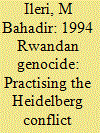

|
|
|
|
|
| Summary/Abstract |
Having suffered one of the worst genocides in recorded history, Rwanda today is a country still striving to maintain the equilibrium between the perpetrators and the survivors. After decades of tension between the Hutu majority and the Tutsi minority, during April to July 1994 an estimated 500,000 to 800,000 people were slaughtered in mass atrocities, with many more displaced from their homes. Political instability, discrimination, traces of colonialism, poverty and competition for power were some of the causes of this horrific extermination. Rwanda has been working ever since to recover from the aftermath of the events that culminated in this government-sponsored slaughter, and has achieved remarkable success – especially in terms of its economy. This study aims to explore the nature of the 1994 genocide against the Tutsi in Rwanda. Fundamentally, it seeks to quantify the intensity and unprecedented nature of the genocide. Understanding how genocides such as this one occurred is crucial for preventing similar future atrocities.
|
|
|
|
|
|
|
|
|
|
|
|
|
|
|
|
| 2 |
ID:
177870
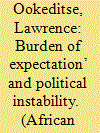

|
|
|
|
|
| Summary/Abstract |
This article argues the fallout between Botswana’s President Mokgweetsi Masisi and his predecessor Lieutenant General Seretse Khama Ian Khama is demonstration of the need for the country to reform its political system to accommodate direct election of the president. This would lessen seeds for political instability in the future. The central argument in the paper is that the system of ‘automatic succession’, wherein whoever is vice president automatically assumes the presidency when a sitting president’s tenure comes to an end, breeds a sense of entitlement and expectation between the alternators of power. The main conclusion of the paper is that the entitlement that comes with ‘automatic succession’ to the presidency is some form of debt of gratitude from the incumbent to their predecessor. This burden of expectation threatens to diminish the autonomy of an incumbent president and could birth political instability. The paper uses the Khama-Masisi transfer of power as its case in point.
|
|
|
|
|
|
|
|
|
|
|
|
|
|
|
|
| 3 |
ID:
177861
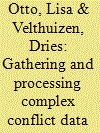

|
|
|
|
|
| Summary/Abstract |
Gathering data, analysing it using appropriate tools and interpreting the information results to make knowledge-driven decisions is a good practice for most security practitioners and scholars interested in peace and security. However, analysts and knowledge producers are consistently confronted with an overload of data and contending views of the causes, dynamics and consequence of violent conflict. Perspectives differs and is sometimes dominated by political interests as well as cultural, ideological, and religious/spiritual beliefs. The outcome of the contentious debates, while important to create a reliable body of knowledge for decision-making, tends to cause a limited understanding and inaction.
|
|
|
|
|
|
|
|
|
|
|
|
|
|
|
|
| 4 |
ID:
177865


|
|
|
|
|
| Summary/Abstract |
Humanitarian intervention has undergone several changes since the Second World War and the justifications behind it are continually expanding and being reshaped as a result of the interventions performed to resolve the conflicts in Somalia, Bosnia, Rwanda, Sudan and Kosovo, as well as a result of the emerging post-9/11 paradigm. Humanitarian intervention, while open to many different definitions, is generally understood as the use of both hard and soft power across state borders by external forces with the goal of preventing or obstructing gross human rights violations without the permission of the state within whose territory force is utilised. Overall, this paper is an investigation into the topic of humanitarian intervention. However, it is primarily an investigation into the most recent manifestation of humanitarian intervention, the responsibility to protect and its failures, in sovereignty, morality, and legality in the context of the United Nations as the ‘Guardian Angel of Global Security’.
|
|
|
|
|
|
|
|
|
|
|
|
|
|
|
|
| 5 |
ID:
177867
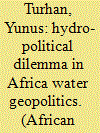

|
|
|
|
|
| Summary/Abstract |
Water-related conflict chronology can be grouped around two broad sets of ideas: On the one hand is material-related conflict such as water stress and under-development; while on the other is management-related conflict including state-failure and lack of governance. In line with the latter form of conflict, this paper gives a specific consideration to the three types of causal factors looming with the potential for conflict over the Nile basin: Political tensions among stakeholders, lack of all-inclusive agreement on management of the Nile water, and states' unilateral actions. By identifying these causal factors, this study limits itself to focus on the initial phase of conflict resolutions, that is diagnosing sources to select some aspects of perceived reality and make them more salient in the methodological context. Based on Johan Galtung's theoretical approaches on conflict dynamics, the paper explores two areas that are lacking in current literature. It accounts for the sources of conflict over the Nile basin hinging on three variables, while mapping the nature of the on-going negotiation process around Ethiopia's “Grand Ethiopian Renaissance Dam” construction. This process is distributive in form and offers a collaborative (win-win) form of negotiations to cement the latter and to redress current predicaments.
|
|
|
|
|
|
|
|
|
|
|
|
|
|
|
|
| 6 |
ID:
177868


|
|
|
|
|
| Summary/Abstract |
The advent of the social media in the past decade has revolutionised communication, overshadowing the traditional ways of communication. Despite its convenience, social media is being used as a conduit for criminal activities. Notwithstanding its dark side, social media has also been utilised in enhancing national security. This study explores the various ways in which social media has been used to enhance national security in Zimbabwe, as well as evaluating the ways of overcoming the social media threats to national security. A total of 274 respondents from members of the public and the security arms of the state were invited to participate in the study through questionnaires and in-depth interviews. In relation to national security, findings reveal that social media is mainly used by the government and its agencies as a platform for explaining key government programmes and safety issues to citizens, as an open source intelligence platform, and for disaster awareness and management. Regulation and monitoring of social media activities was viewed as the most effective measure against social media-induced threats, followed by temporary blocking of social media sites. Notwithstanding the perceived effectiveness of these measures, respondents raised concerns over the human rights implications of the measures.
|
|
|
|
|
|
|
|
|
|
|
|
|
|
|
|
| 7 |
ID:
177864
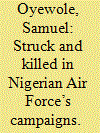

|
|
|
|
|
| Summary/Abstract |
The involvement of the air force in a series of Joint Task Force (JTF) arrangements, which were initiated to neutralise various security threats, accounted for a growing record of air campaigns in Nigeria. Although there is growing public attention for airpower in Nigeria, its operational relevance and associated concerns have received inadequate academic attention. Accordingly, the understanding of recent developments in Nigeria’s air campaigns to neutralise targeted threats against security across the country remains largely limited and incoherent. This study, therefore, seeks to examine trends in air campaigns, with emphasis on cases, locations, targets and impacts of airstrike, in Nigeria. For this purpose, 241 cases of airstrike with 3,210 fatalities and 273 cases of air/land operations with 2,186 fatalities that were recorded across Nigeria in the last two decades were assessed. This is expected to contribute to a growing body of knowledge on air campaigns of the Nigerian Air Force (NAF) as well as their relevance to neutralise targeted threats and associated human rights concerns in internal security operations.
|
|
|
|
|
|
|
|
|
|
|
|
|
|
|
|
| 8 |
ID:
177869


|
|
|
|
|
| Summary/Abstract |
Prior to May 2016, the relatively unknown community of Vuwani in the Limpopo Province of South Africa had hardly been prone to violent protests and destruction of public property. This changed when the Limpopo High Court dismissed an application by the Masia Tribal Council and eight others to set aside the Municipal Demarcation Board’s decision to incorporate Vuwani and parts of Thulamela Local Municipality into a single new municipality. What followed were protracted protests, which resulted in the burning down of twenty-four schools. Employing the interrelated concepts of democracy, citizenship, rights, and accountability as conceptual and analytical lenses to explore the drivers of violence and protests, the authors conducted in-depth interviews with key stakeholders, and focus group discussions with high school learners. They found that the demarcation dispute was steeped in socio-cultural dynamics, which the Municipal Demarcation Board had overlooked in making its decision. The article offers a number of policy recommendations that could potentially reduce the negative consequences associated with the demarcation of municipal boundaries in South Africa.
|
|
|
|
|
|
|
|
|
|
|
|
|
|
|
|
|
|
|
|
|